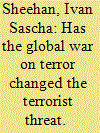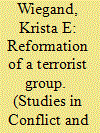| Srl | Item |
| 1 |
ID:
090325


|
|
|
|
|
| Publication |
2009.
|
| Summary/Abstract |
Whether the Global War on Terror (GWOT) has changed the terrorist threat is a matter of controversy. This study, using transnational terrorism events data from 1993 through 2004, employs a time-series approach to investigate the extent to which the onset of the GWOT (beginning with the invasion of Afghanistan) and related events (the invasion of Iraq, the capture of Saddam Hussein, and the release of photos from Abu Ghraib) are associated with changes in transnational terrorist activity, its frequency, dispersion, lethality, type of attack, and type of victim of transnational terrorist incidents.
|
|
|
|
|
|
|
|
|
|
|
|
|
|
|
|
| 2 |
ID:
090321


|
|
|
|
|
| Publication |
2009.
|
| Summary/Abstract |
This article looks at the dynamics of Diaspora groups as a possible catalyst for peace-building within violent segmented societies. With the help of two case studies, Irish-America's role in Northern Ireland and Sri Lankan Tamil Diaspora's role in Sri Lanka, it locates the variable impacts of Diaspora involvement in violent conflicts within their homelands. Despite their unique histories and individual complexity, both of these cases illustrate that Diasporas have a significant role to play in peace-building, are diverse rather than homogenous communities, and that they represent an important and often underutilized resource to bring negotiated settlement to violent conflicts.
|
|
|
|
|
|
|
|
|
|
|
|
|
|
|
|
| 3 |
ID:
090324


|
|
|
|
|
| Publication |
2009.
|
| Summary/Abstract |
Azerbaijan is deemed to be the most secular of all post-Soviet Muslim counties. Nevertheless, growing independent Islamic activism, inspired by the international Islamic discourse and helped by foreign Islamic actors, and combined with a repressive regime response to this activity carried out under the banner of antiterrorism may contribute to make Islamism a potent factor in Azerbaijan. This article maps out independent Shi'a and Sunni activism and regime response in Azerbaijan. By assessing the dynamics between these two factors the article draws conclusions on the potential for politicization and radicalization of Islam in Azerbaijan.
|
|
|
|
|
|
|
|
|
|
|
|
|
|
|
|
| 4 |
ID:
090319


|
|
|
|
|
| Publication |
2009.
|
| Summary/Abstract |
Despite the classification of Hezbollah as a terrorist group by several states, Hezbollah is recognized as a legitimate political party within Lebanon. The purpose of this article is to probe at the reasons why Hezbollah was able to achieve its current status in the Lebanese government while it still maintains a powerful, well armed military branch that has used force recently to influence Lebanese politics. An examination of Hezbollah's life cycle suggests that two major factors were decisive: 1) Hezbollah's political leverage over the majority government, and 2) choices by Hezbollah's leaders to moderate their objectives to achieve domestic political goals.
|
|
|
|
|
|
|
|
|
|
|
|
|
|
|
|
| 5 |
ID:
090322


|
|
|
|
|
| Publication |
2009.
|
| Summary/Abstract |
The main argument examined in this article is that the escalation of political violence in Northern Ireland between 1969-1999 resulted because of the state's reliance on repression and this had conflicting effects contributing to the rise in violence. Perhaps the most important finding reached by this research was that a state's reliance on repression is positively associated with more insurgent violence. This research suggests that variations in outcomes to the use of force by a democratic state may result because one may assume a linear model exists when in reality the true relationship maybe curvilinear.
|
|
|
|
|
|
|
|
|
|
|
|
|
|
|
|